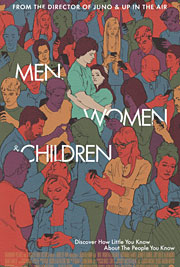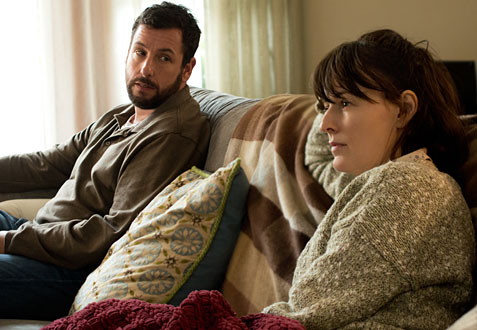Movie Review: “Men, Women & Children”

It’s never fun seeing a filmmaker you enjoy stuck in a rut, but that’s exactly what seems to have happened with Jason Reitman, who tainted his near-flawless body of work with last year’s soapy romance “Labor Day.” And though his latest movie isn’t nearly as bad, it’s a fairly mediocre drama that doesn’t completely succeed in its attempt to be a merciless social commentary on communication in the digital age. “Men, Women & Children” might as well have come with the subtitle, “Or Why the Internet is Really Bad,” because that’s pretty much the message that Reitman is preaching. Is it a little heavy-handed, melodramatic and obvious at times? Sure, but it also features some great performances and an intriguing multi-story narrative that doesn’t pull any punches in its denunciation of the internet.
Adam Sandler stars as Don Truby, a middle-aged schlub whose sex life with his wife Helen (Rosemary DeWitt) is so non-existent that he’s resorted to watching porn on his teenage son’s computer. Bored with the lack of excitement in his marriage, Don hires an escort from an online service, totally unaware that Helen is using a website for married people seeking affairs to have one of her own. Their son Chris (Travis Tope), meanwhile, has become so desensitized from watching porn at a young age that he’s unable to perform when he hooks up with sexpot cheerleader Hannah (Olivia Crocicchia), whose own mother (Judy Greer) has been enabling the wannabe actress by posting provocative photos of Hannah on her modeling website. And the worst part is that she doesn’t think she’s doing anything wrong.
The other kids at school are just as messed up. Fellow cheerleader Allison (Elena Kampouris) has resorted to anorexia in an attempt to win the affections of the school hunk, while star quarterback Tim (Ansel Elgort) has been taking his mother’s recent abandonment so hard that he’s quit the football team and rechanneled that energy into playing an online role-playing game. Having lost most of his friends as a result of that decision, Tim forms a bond with shy girl Brandy Beltmeyer, whose mother Patricia (Jennifer Garner) is so obsessed about the potential dangers of the internet that she monitors all of Brandy’s online activity and tracks her every movement with her phone. So when Patricia discovers that Brandy has been secretly hanging out with a boy, she doesn’t think twice about the ramifications of her constant meddling.
There’s a lot going on in this movie – so much, in fact, that some of the characters aren’t explored as deeply as others – but Reitman handles the interconnected narrative remarkably well, bouncing from one story to the next with such breeziness that you hardly notice the two-hour runtime. Not every character or relationship is given equal attention (Don’s son is horribly underdeveloped, and though Garner is great in her role as the overprotective mom, it’s a bit one-dimensional), and a few stories aren’t even resolved by the end, but there are some really strong plotlines as well, particularly the ones featuring Sandler and DeWitt, and Dever and Elgort. This isn’t the first time that Sandler has tried his hand at more serious fare, and both he and DeWitt turn in solid performances, but it’s young up-and-comer Kaitlyn Dever (“Short Term 12,” “Justified”) who delivers perhaps the most engaging character of the lot as the repressed high schooler stripped of the chance to enjoy a normal teenage life.
Of course, this isn’t the first time that this topic has been broached before in cinema. Henry Alex Rubin’s underrated 2012 drama “Disconnect” tackled similar material in its exploration of the muddled lines regarding reality and identity on the internet, and that film arguably did a better job, partly because it had fewer storylines to juggle. Reitman’s movie has some interesting things to say as well, and the way in which he visualizes the constant stream of texts, Facebook posts and other digital content in our lives is really cool, but it also doesn’t reveal anything that most people with a basic knowledge of the internet didn’t already know, and in that regard, the film feels a little dated.
Yes, going online can be dangerous, but there are plenty of positive things about the internet as well, and Reitman, working from a script based on Chad Kultgen’s novel, seems afraid to touch upon those beneficial aspects in fear that it will only dilute his message. Instead, it’s the incessant miserableness (no one in this movie is happy) that causes “Men, Women & Children” to occasionally feel so one-note. Everyone’s mileage will vary as a result, but there’s enough good in the film – or at least good intentions – that it’s able to hold your interest even when it’s not firing on all cylinders.
Related Posts
Comments Off on Movie Review: “Men, Women & Children”
Posted in: Entertainment, Movie Reviews, Movies
Tags: Adam Sandler, Jason Reitman, Jennifer Garner, men, Rosemarie DeWitt, Women & Children, Women & Children review
















